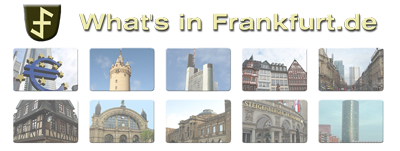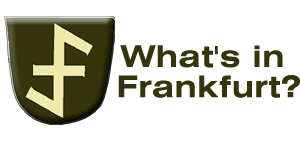
First mentioned in 794, an original stone age settlement near present-day Frankfurt's cathedral had developed by Roman times into a garrison town, and Frankfurt later became a place of importance in the Holy Roman Empire.
As its market flourished, so did its significance as a trade city; by the 12th century the 'Frankfurt Fair' attracted business from the Mediterranean to the Baltic.
With Frederick I (Barbarossa) in 1152, Frankfurt became the site of the election and coronation of all German kings. The last German emperor was elected in 1792, and by the time the Holy Roman Empire collapsed in 1806 the region was under French control.
It was in Frankfurt in 1848 that Germany's first-ever parliamentary delegation met at the Paulskirche. Although this parliament was disbanded by the Prussians, Frankfurt was hailed, much later, by US President John F Kennedy as the 'cradle of democracy in Germany'.

About 80% of the centre was destroyed by Allied bombing raids in March 1944. Plans to raze the remains of the Alte Oper (old opera) were vigorously opposed by residents and a reconstruction of it, along with much of the historic city centre, was undertaken. Known as the Roemerberg, it was completed in 1983. Today its banking district - a shimmering symbol of Germany's post-war economic redevelopment - continues to reach new heights.
Frankfurt originally means "Fjord of the Francs"; and that flimsy translation sounds like a romantic documentary, because it is: the French use to cross a Fjord (a fjord is a shallow section of the river, for those not up to scratch with your Nordic words that crossed-over in England probably thanks to Viking influences) that is has now been swept aside by progress but nonetheless formed the point of settlement for what is now Frankfurt.
So, the French had the north side, and the Saxons (of Anglo-saxon fame) lived on the southern side, hence the appropriately named Sachsenhausen.
As the years rolled by, the Romans moved in (you can still see the ruins next to the St Bartholomaeus - Kaiserdom) and Frankfurt became a garrison town. Then when the Roman empire was eroded other powers filled the vacuum, like the Holy Roman Empire.
Most importantly, Frankfurt became a trading city, and being in the heart of Europe, this was probably a foregone conclusion. But what made a difference was that it was a free-trade city; supposedly less-taxes and tariffs.
The first recorded Frankfurt Fair was in the 12th Century, attracting customers as far North as the Baltic and as far south as the Mediterranean. And where there's valuable trade, there's war:
The defence of the old Frankfurt are still visible, visit the Eschenheimer Tor and the Green Belt; the Green Belt is most interesting because yet it is a green park that rings the city, but it use to be a protective moat to keep unwelcome marauding enemies at bay. The French were the last to have siege Frankfurt.
German Modern History cannot be explained without mentioning a few key words, so to make haste and avoid amateur historical lecturing you can close one eye and skim read the following verbose sentence: Everything the Nazis did came back at them and the people that unwittingly supported them and Frankfurt is a fine example; a tale of profit (see the I.G. Farben Building), tragedy (the exportation of the Jews), destruction (carpet bombing) and re-birth (the German economic miracle (based in part on re-building their bombed out cities) and Frankfurt's status as a European economic capital, for proof look no further than the new ECB building) through hard work.
 Frankfurt in 1945, bombed out.. Picture from WikiPedia.
Frankfurt in 1945, bombed out.. Picture from WikiPedia.
If ever the Cold War went hot and the Warsaw Pact ventured to roll into West Germany and then NATO impressed the rest with its high-tech command and control technology to repel the biggest possible battle of the World War Three that never was, if the Warsaw Pact decided to get nasty with a strategic nuclear weapon, Frankfurt would have been high on the list of possible candidates. Europe lived under the shadow of nuclear wipe-out, and Frankfurt was the bulls-eyes, considering its heavy allied presence.
Modern Germany is Modern Frankfurt, yet Germany is decentralized country, and Frankfurt is the main conduit of money for Germany, Europe, and maybe even Chinese Yuan coming into Europe. In the days of the mighty U.S. dollar, before they really went off the Gold Standard, the dollar was king. And as Frankfurt was host to a major part of the NATO military, including many off duty US soldier with fistfuls of US dollars looking for fun in Frankfurt's Red Light Area, you can imagine the influx of currency. Fast forward to a shift of power and Russian roubles and Chinese Yuan are rising into prominence.
As the Cold War thawed and the Berlin Wall came crumbling town, the Americans went off to raise hell in the Middle East, and unified Germany got back to being a proper industrious country. However, finance and fancy cars (BMWs, Mercedes, Porsche, Audi etc) are not the mainstay of the German economy - the mittlestand is. That's the thousands of companies that make things that are exported all over the world.
Frankfurt's is a financial bridge between the world and German industry.
Due to the city of finance profile of Frankfurt, tourists and people passing through forget that there is another side, Frankfurt is like any other city and has its different crowds, their habitats and peculiarities. The best thing about modern Frankfurt is that it is a manageable city, and looked after by the hands that feed it.
If you're interested in reading online about Frankfurt's history, you can visit the Frankfurt Tourism's Frankfurt City History or everyone's favourite peer-to-peer, ad hoc, online history reservoir, Wikipedia, to read about the history of Frankfurt.
